FEAMC – Conversano, Bari (Italia) 18-19 ottobre 2013
EUROPA, ECUMENISMO, ETICA – Europe, Ecumenism, Ethics
Alfredo Anzani
FEAMC past vice president
1 . Europe
” Wondering what Europe will be like tomorrow or what it is today means, first of all, to ask how Europe has become what it is. ” (Hans -Georg Gadamer )
Is there such a thing as Europe?
I do not intend as a geographical expression; not even as a political expression, still reluctantly developing with many difficulties, imperfect and incomplete. Rather, I mean as an expression of “humanity”, that is, as a common homeland of different populations that have been enemies for ages and that are now brothers, or on the way to making this dream come true.
From 1945 to 1959 men worked for a Europe of peace with the primary objective of putting an end to the constant wars between neighbouring countries that had led to World War II. In the Fifties, the European Community Coal and Steel began to unite European countries economically and politically in order to ensure a lasting peace. The six founding members were Belgium, France , Germany, Italy, Luxembourg and the Netherlands. In 1957 the Treaty of Rome established the European Economic Community ( EEC) , the so-called ‘ Common Market ‘.
On 1 January 1973, Denmark, Ireland and the United Kingdom joined and the number of member states of the European Union rose to nine .
In 1979, the European Parliament was elected for the first time by universal suffrage.
In 1981, Greece became the tenth member of the EU, while Portugal and Spain joined the EU in 1986. In the same year, the European Act which created the ‘ Single Market’ was signed. On 9th November 1989 the Berlin Wall was knocked down and, for the first time after 28 years, the borders between East Germany and West Germany were opened and soon the two nations would be reunited in a single country .
The nineties were the decade of two important treaties: the Treaty of Maastricht on European Union ( 1993) and the Treaty of Amsterdam (1999). European citizens were concerned about how to protect the environment and how they could act together in the field of defence and security. In 1995 the EU gains three new member States: Austria, Finland and Sweden. A small village in Luxembourg, ‘Schengen’, gives its name to the agreements that gradually allow citizens to travel freely without passport control at borders.
In 2002, the euro becomes the new currency for many Europeans .
Today, in 2013, 28 countries compose the mosaic of Europe: Austria , Belgium, Bulgaria, Croatia, Cyprus, Denmark, Estonia, Finland, France, Germany, Greece, Ireland, Italy, Latvia, Lithuania, Luxembourg , Malta, Netherlands, Poland , Portugal, United Kingdom, the Czech Republic, Romania, Slovakia, Slovenia, Spain, Sweden and Hungary.
The 28 countries have adopted institutional bodies that are called “European”: a parliament (Strasbourg / Brussels ), a Commission , a Council, a Court of Justice (Luxembourg), a European Bank .
There is definitely a Europe of markets, banks, common currency, free trade and circulation, there is even a “European citizenship” , albeit of a “weak” type, which supports the various national citizenships.
Europe considers herself a “Union “. How true is this affirmation?
What is an identity that unites founded on?
The lesson history imparts is that of fratricidal wars – the term fratricidal is apt because the nations involved are linked in brotherhood.
This brotherhood has its seal in the Christian evangelization.
One can, thus affirm the existence of ” Christian roots of Europe “. These roots have provided the strongest basis for the development of the idea of a Europe deriving from Christian thought. Without Christianity , as well as without Greek -Roman culture, Europe would not be thinkable.
Benedetto Croce, in his famous article ” Why we cannot call ourselves Christians ,” writes: “Christianity has been the greatest revolution that humanity has ever accomplished: so big, so comprehensive and profound, so fruitful of consequences, so unexpected and irresistible in its finished form, that it is not surprising it may still appear a miracle, a revelation from above, a direct intervention of God in worldly affairs, that from him have received laws and indications that are by no means new. All other revolutions, all the major discoveries which mark epochs in human history, cannot compare to it. […] And the revolutions and discoveries that followed in modern times and invested all of man, his very soul, are unthinkable without the Christian revolution , in relation of their dependence on it […] The reason for this is that the Christian revolution worked at the centre of the soul, of conscience, and, giving prominence to it, made it acquire an almost new virtue, a new spiritual quality, which until then humanity had lacked. Men , geniuses , heroes who came before Christianity accomplished wonderful actions, beautiful works , and transmitted to us a rich treasure of forms, thoughts and experiences, but they lack that accent that unites, and that only Christianity gave to human life .”
Federico Chabod comments thus the famous words of Benedetto Croce : “We cannot not be [ Christians], even if most do not follow the practices of worship , because Christianity has shaped the way we feel and think in an indelible manner, and the profound diversity that exists between us and the ancients, between the way we consider life and that of a contemporary of Pericles and Augustus is precisely due to this great fact, no doubt the greatest of universal history, that is, the Christian word. Even so-called ‘ free-thinkers ‘, even ‘ anti-clericals ‘ cannot escape this common fate of the European spirit . “In the formation of the concept of Europe and the European sentiment, moral and cultural factors have had absolute pre-eminence, or, rather, an exclusive one.”
The great cathedrals of the Middle Ages , the history of monasticism , the tradition of faith and culture, art , all of these point to, unequivocally, a Christian imprint.
Thomas Eliot remarked authoritatively that ” The dominant force in the creation of a common culture among peoples, each of which has a distinct culture, is religion. […] In Christianity, the arts have developed. In it, the laws of Europe – until recently – have had their roots. And it is against a Christian background that all our thinking makes sense. A European may not believe that the Christian faith is true, and yet what he says, and does, derives from the part of Christian culture of which he is heir to , and draws meaning from that. Only a Christian culture could have produced a Voltaire and Nietzsche . I do not think the culture of Europe could survive the complete disappearance of the Christian Faith . And I am convinced of that not only as a Christian, but as a student of social biology . If Christianity goes, all our culture goes, too. “
What is the greatest contribution of Christianity?
I think it is the idea of the person. It is no mere coincidence that in the Charter of Rights – Article 1 – there is the reference to the dignity of every human person. What is the meaning of the word “person”? The idea of person is a philosophical idea and there is no need of Revelation to justify it,
though historically it was born in a Christian environment and, specifically, in a theological environment .
Giovanni Reale writes that the spiritual foundation of Europe is one of the key concepts of Christianity, namely the concept of “man” as a “person” connected with the radical reappraisal of the human body . That of the person is a concept that the Greeks had not reached and, as far as the body was concerned, they had a negative concept of it. The Christian message upsets the Greek vision.
Sǿren Kierkegaard delves deep into the Christian message. He writes: ” [ Christ ] never found a roof so miserable that prevented him from entering with joy , never a man so insignificant as not to want to make his heart his home for him, and never renounced to his divine authority. “
Why is this ? In Genesis God says: ” Let us make man in our image, in our likeness ” and Psalm 8 says: If I look at your heavens, the work of thy fingers , the moon and the stars which you created, what is man that you are mindful of him and the son of man that you care for him ? Yet you have made him little less than the angels, with glory and honour you crowned him, gave him power over your creation, put all things under his feet: all flocks and herds, all the beasts of the field ; the birds of the air and the fish of the sea. “
With the coming of the Son of God who became man, man is conferred with a sense of sacredness St. Augustine underlines this in an effective way: ” Let us therefore rejoice and give thanks to God, not only have we become Christians, we have become Christ himself. You see, brothers and sisters? Do you realize the grace that God has bestowed on us? Remain in awe , rejoice : we have become Christ! If Christ is the head and we the limbs, the whole man is made of him and us. ” And adds in a sublime way : ” God has made himself man, what will become of man , if God has made himself man? “
Christianity is capable of making what is distant near, the stranger brother, of creating a community that goes beyond the bond of flesh. It deepens the bond of flesh, but creates a community that goes beyond this bond. This defines European culture. Europe is not only a continent in geographical terms, but a cultural and historical concept .
If Europe has become what it is, it is due to Christianity. Europe is not a unique geographical entity, such as Africa or America; geographically speaking, Europe is an appendix of Asia. Neither is Europe an ethnic unit. Christianity has brought together different peoples and tribes, under one faith , creating a vast, but highly versatile, cultural space. The Pilgrim routes to Rome and Santiago de Compostela, which developed far and wide across Europe led the great monastic orders and universities to unite Europe with all its differences. It was Christianity that unified Europe not as a natural entity but as a historical entity: a communion of culture, values and faith.
If Europe is not to be considered a mere political or economic challenge, if the sense of freedom that has always belonged to it must be recovered, one must cast an eye on its origins in the knowledge that the construction of a “common house” depends on the possibility of renewing the European’s cultural and spiritual roots .
2 ) Ecumenism
These Christian roots have known, throughout history, stories of painful disruptions.
The Protestant Reformation, for example, that gave rise to that very same religious, political and cultural movement, that produced in the 16th century, the fracture of Christianity in several communities, groups or sects. The Reformation arose mainly from religious motives dictated by the rediscovery of the Gospel as a proclamation of the free grace of God, given to the sinner, whatever his merits, and the criticism of the Church’s spiritual and moral degeneration. The conventional date for the beginning of the Protestant Reformation was October 31st 1517 , the day when Martin Luther nailed to the door of the church at Wittenberg castle his 95 theses against the scandal of indulgences, which tried to deal with the problems of penance, of sin and grace. The Lutheran doctrine became a political weapon of the German princes who saw in it the opportunity to free themselves from imperial authority and take possession of church property . After the diets of Speyer (1529) and Augusta ( 1530 ), they joined the League of Smalcald ( 1530), and fought against the Emperor Charles V until the Peace of Augsburg (1555), which sanctioned the division between Catholics and Protestants in accordance to the principle cuius regio, eius religio , which required the subjects to follow the religion of their prince, whether Catholic or Lutheran .
In 1531 Geneva became the centre of the Reformation, where Calvin implemented a strict theocratic organization reformed and codified the Reformist thesis , highlighting the theme of predestination. The Calvinist doctrine (or reformed doctrine) is widespread in Europe and in the English colonies in America. In England , following the anti-papal policy of Henry VIII ( Act of Supremacy , 1534 ) , the Anglican Church was born, which retained the episcopate and traditional forms of worship , while accepting Reformed theology . As part of the religious crisis of the sixteenth century, sects and a radical reform movements spread, harshly contrasted by both Catholics and reformists.
One cannot, of course, forget the schisms. Among them, the first major schism within Christianity, which occurred in 1054. The division among Christians of the West and the Christians of the East is called Oriental Schism, because it took place in Constantinople ( in the East ) in 1054 .
Religious wars have also been a source of tears, pain and suffering. Those between Protestants and Catholics tore Europe apart between the 16th and 17th centuries. They broke out in Germany, France, the Netherlands and north eastern countries Europe. France , in particular, was torn apart by religious strife for years and the most notorious event was the massacre of Saint Bartholomew’s Day ( August 23rd to 24th 1572) when in Paris three thousand Huguenots ( French Calvinists ) were killed. The wars ended with the ascension to the throne of Henry IV and the granting of the Edict of Nantes, which recognized that partial freedom of worship to the Huguenots . During the 17th century the most enduring conflict was the Thirty Years War ( 1618-48 ) , involving Catholic and Protestant countries and countries caused by the attempt of the Habsburgs to establish a State Catholic in the heart of Europe. With the Peace of Westphalia (1648) the sad period of the wars of religion in Germany came to an end and the existence of three religious denominations was sanctioned, Catholicism, Lutheranism and Calvinism, and the right of subjects to profess a religion other than that professed by their princes was recognized.
Despite all this evil, these divisions – expressions of the action of the “prince of this world” who always wants to create divisions – ecumenism was born.
The etymological origin of the word ecumenism is, from the Greek , oikoumene: inhabited earth . The term refers to the movement of re-union of Christian Churches that aims to overcome the differences, recovering the common values of faith. Ecumenism tends to represent the universal Church in which all its members are united by the love of Christ.
The Ecumenical Movement, which developed in a Protestant environment, began with the Missionary Congress in Edinburgh (Scotland) in 1910; there was the need to present a united front in pagan countries.
The Catholic Church considers the separation from the Orthodox and the Protestants as a deep wound inflicted on the Church of Christ. A hundred years after the birth of the Movement, a reflection on this is necessary: the passion to overcome the division of Churches is the essential condition for evangelization, moreover, the task of proclaiming the Gospel requires that you do not stop striving for the unity of the Church according to the desire of Christ every day.
The religious significance of ecumenism in the unity of the Christian faith finds its origin in Jesus’ prayer : ” I pray not only for these but also for those who will believe in me through their word, so that they may all be one. As you, Father, are in me and I in thee, that they may also be as one in us, so that the world may believe that thou hast sent me ” (Jn 17, 20 )
dialogue was, and is, an essential tool to achieve unity .
I will briefly recall the most important moments:
– The work of the Second Vatican Council ;
– The meeting, which took place on 27 October 1986 of the world’s religious leaders who met in Assisi with the hope : “Let there be Peace ! ” 62 representatives of different religions attended it;
– The Encyclical Ut unum sint of John Paul II on May 25, 1995;
– The periodic ” European Ecumenical Assemblies .”
There has been a development of ecumenism in Europe. Focusing on more recent events , I remember that on May 10th, 2013 Pope Francis received the head of the Coptic Orthodox Church of Egypt Tawadros II and on 5th September 2013 , when he met with Marthoma Paulose II , Metropolitan of the Malankara Syrian Orthodox Church , he affirmed : “I think in the ecumenical journey it is important to look with confidence to the steps taken to overcome prejudices and closures, which are part of the ‘ culture clash ‘ , which is a source of division and give way to the ‘ culture of encounter ‘ , which educates us to mutual understanding and to work for unity. This is impossible to do on our own: our weaknesses and poverty slow down the path. For this reason it is important to intensify prayer, because only the Holy Spirit with His grace, light, and warmth can melt our coldness and guide us towards an ever greater brotherhood . “
The operational and cultural side-effect of the ecumenical journey is to observe with the eye of faith, our common faith , the human condition of Europe, the men , of the poor in the first place.
From 1945 onwards, the ecumenical thought has always played a decisive role in Europe.
Cardinal Kasper , President of the Pontifical Council for Promoting Christian Unity, in May of 2011 stated with clarity and incisive argument :
“Catholics and Protestants clung to each other and there were no longer religious parties but only Christian Democratic parties. After the fall of the Berlin Wall, relations with Eastern Europe and then the ones with the Orthodox Churches began in a new way. If the integration between Eastern and Western Europe must be something more than the restoration of a common economic zone , then cultural integration is not possible without ecumenism with the Churches of the East, which , over the centuries, have greatly influenced the culture of the populations of Eastern Europe. The Churches which, with their divisions, have divided Europe, too, can now, following the ecumenical approach, give impulse to unity. Ecumenism itself does not have a political purpose , but a religious – ecclesiastical one; however, indirectly, especially in Europe, it has important political effects . “
Kasper is convinced that ecumenism is beneficial to Europe , but Europe is also beneficial to ecumenism.
“In the past, divisions were almost always determined in a decisive way by political factors. It was so in the case of the separation between East and West, and again, this is what happened to the Reformation in the sixteenth century. Today, this chain of cause and effect is reversed. The division between Western and Eastern Church was and is due, to this day , even to a cultural estrangement. The political unity of Eastern and Western culture leads to a rapprochement that, at least in the long term , will also be useful to ecumenical rapprochement. The situation today is different from that experienced by the founding fathers , who were convinced Christian politicians. On the basis of the order of Christian values Europe, for decades , had a history of unparalleled success. Never before, had there been a period of peace so long, in Europe. Today, Europe is no longer viewed enthusiastically.’ It is undergoing a deep crisis of a much wider scope than simply a crisis of the European common currency, the euro.
There are many reasons for this. Europe is falling into the hands of bureaucrats who are characterized by a sort of legislating fury: laws and regulations are decided centrally rather than locally, adapting them to the traditions and customs. In addition, Europe has brought on an economic boost and a well-being, which have become highly visible. A sense of greed has developed, kindled by short-sighted nationalist feelings.
Christians should be the first to look beyond the needs of their own nation . If they do not do so, then they cannot be called Catholics. Europe is about to break away from its roots and, therefore, like a plant, destined to die. Thus, Europe cannot remain as it is, it must remember and strengthen its Christian origins. If the soul of Europe weakens, in the long run, not even its body, made up of culture, economy, politics , etc., can remain strong. Without a common spirit, without ideals and values, centrifugal forces will take over and lead to its destruction. In terms of human history, there has never been a culture that did not have a religious foundation . Europe has embarked on a unique journey, in the cultural and religious fields, which has not yet passed the test of history. “
This crisis of Europe is the common challenge of all the Churches , Cardinal Kasper underlines.
” Here all the churches are called to ecumenical cooperation . The crisis has actually begun. For a long time there have been efforts and joint projects with the Ecumenical Patriarchate of Constantinople, and as of some years ago, even with the Russian Orthodox Patriarchate of Moscow.
Between the Council of European Bishops’ Conferences (CCEE ) and the Conference of European Churches (CEC ) a good cooperation has also developed. Honestly, I regret to add that cooperation with some evangelical churches has recently become more difficult. Indeed, their position regarding some ethical issues (marriage and family, abortion , relationships between people of the same sex , bioethics, etc. . ) are different from ours and those of the Orthodox Churches . This is a new situation , because , in the last 500 years, we have had disagreements on dogma, but never on ethical matters. So the ecumenical dialogue ranges , in the meantime , from a strictly theological and to ethical issues and practical cooperation on the fundamental Christian values that are at the basis of European culture. Europe needs the cooperation between churches not to lose the foundation of its values and to preserve its soul . Europe needs ecumenism to remain being Europe. “
Cardinal Kasper adds to his reflection phenomena like emigration and immigration, persecution and forced exiles , because of which, today, members of other religions are living in our midst.
” Emigration and immigration are a ” signs of the times “, affecting many millions of people around the world. So, in the middle of Europe a religious pluralism, which is a novelty, has arisen, In many countries, there are living among us representatives of non-Christian religions , especially many Muslims . Nowadays, in all the major European cities, one finds mosques as well as churches. This new pluralism has , on the one hand , led to a widespread relativism , much strengthened by the influence of the mass media as of mass tourism . Migratory movements and new situations have always existed in European history. Europe is not a fixed entity , but is the result of a blend of very different cultures Jewish , Hellenistic-Roman , Germanic , Slavic , Nordic. Europe is involved in a process in which its core values are forever shuffled and put back together . Today, even in the encounter with other cultures and religions , a redefinition of European identity is at work. So as not to allow that this redefinition ends up in a loss of identity, Europe needs a rediscovery and a strengthening of its Christian roots. Europe needs a new evangelization . “
And Kasper concludes as follows:
” The Second Vatican Council has recommended a cooperation in the mission. This is true , as far as possible , also for the new evangelization . It would already be a great achievement if the new evangelization were not intended as a means for Catholics, Protestants or Orthodox , etc to prevail over other religions but as a way to establish the foundations of a common Christian faith. The book of Hebrews in the New Testament , speaks of a similar situation: the enthusiasm of Christian origins having become lukewarm , many Christians need to re- strengthen the initial foundations of the Christian faith. This way is the best to guarantee that Europe does not lose its soul, but rather rediscovers it ” .
Already in April 1987 Pope John Paul II admonished the members of the German Bishops’ Conference in Cologne: “In the ongoing process of unification among the peoples of this continent, the Church must engage itself resolutely to reach a constructive agreement on moral values , that will lead to the further development of society. It is all about promoting a sense of the fundamental human rights , the spirit of reconciliation and cooperation , the quest for authentic justice and consensus on the transcendent destiny of man, which can give the ultimate meaning to life and death. “
3 . Ethics
As faith in Christ is something different from an ethical concept( Faith differs even from religion ), there is no doubt that a vision of the problems of man and of the world( and a perception of the true and false values in field of common sense , or different opine , as well as in the field of human conduct ) consistent with faith is neither indifferent, nor equivalent. Not only in relation to the concept of “sacredness” , but in relation to a cultural rationality immersed in Christian roots.
To summarise: the matrix of all human rights is the dignity of the human being, who is the central element of any ethical matter.
The first chapter of the “Charter of Nice ” reads as follows: ” Human dignity is inviolable. It must be respected and protected . ” It must, therefore, be used to orient the cultural tendencies that affect human life and human death .
Among the many problems at hand, it is well-worth remembering:
a) The dignity of every single life and the problems of in vitro fertilization :
– Overproduction, excess life , future destruction of fate ;
– Destructive experimentation ;
– Attempts to falsify science denying the status of ” person ” at conception , while science – says it is ab initio a being of the human sphere ;
– The defence of life as defence of civilization.
b ) The patient’s dignity , the dignity of the dying : the dignity of a person , at any stage of his life, derives from the intrinsic worth of the human being and not from the specific situation in which it is. Dying with dignity means for the sick person to be given the right to have an assistance which is respectful of his existence , meeting all his needs, biophysical, physical , psychological and spiritual ones . This statement is based on some fundamental principles: the patient in the last stage of his illness is and remains the person who must be helped to face a dramatic moment of his existence. Life retains its intrinsic value despite the decline of physical conditions.
Faced with the tendency to lose the global view of the patient , the doctor, when approaching the patient, will not identify it with a simple case study , with a medical record , with the number of the bed. He will try, insofar as possible, to build a personal relationship with the patient , that is respectful of him. He will help in a patient and straightforward way, the patient to understand his real state of health , he will make him a part of the treatment plan by presenting the various alternatives, he will enable him to express a real informed consent.
Faced with a culture that does not defend human life , the doctor will courageously affirm his yes to life , aware of being its guardian and servant ( as it is written in Evangelium Vitae ) .
He will recognize the life from its beginnings in the womb and will protect it to its natural end. He will distinguish between the aggressive treatment and therapeutic abandonment and alleviate the last sufferings of the patient he is caring for, assisting him in the bouts of life.
In consideration of a medical research that is increasingly engaged in a relentless and expensive struggle against all diseases, it is important never to forget the need to ensure , always , proper care of the person and compassion in the face of death.
c ) The ethics of the family is an extremely delicate area where ” not discriminate ” the ontological significance of the union between man and woman is subverted and homosexual unions are suggested . It’s not a question of homophobia , no one should be discriminated , but reality cannot be falsified . On these points , which mark solid boundaries , we must continue patiently to insist and offer explanations, in a gentle but firm way.
Cardinal Kasper writes with force: ” Since the end of the 60s and 70s , in Europe there is a new wave of secularization and emancipation from the order of Christian values.
Cardinal Tettamanzi asks whether: “Beyond the cultural and religious differences, the moral sensibility and the legal systems present in each European state, is it possible to find an ethical common denominator at EEC level? To answer yes to this question, we must be convinced that there is no such thing as a “moral stranger”. In life, no one is a stranger: we are all fellow citizens and responsible one of the other’s life. As we can read in the book of “Genesis”, God asks Cain of Abel: “Where is your brother?” (Gn 4,9). Moreover, God says to Noah, after the flood: “I will ask man of man’s life, to each of one’s brother” (Gn 9,5). Thus, one can understand the real significance of “an agreement” or of a “convention” in bioethics. It is not a question of rights achieved through a majority or minority of votes, but of a common responsibility towards all we have in common. This is possible by acknowledging that what men has in common – humanity – is by far greater than what differentiates them.”
4 . Conclusions
To conclude, I quote the words spoken on May 13th, 2004 by the then card. Joseph Ratzinger, Prefect of the Congregation for the Doctrine of the Faith, who later would become Pope Benedict XVI:
” How are things going ? In the violent upheavals of our times there is an identity of Europe, which has a future and for which we can struggle with everything we have […] I would just like to indicate briefly the fundamental moral elements, which, in my opinion, should not miss in this struggle.
The first element is the ‘ ” unconditionality ” with which human dignity and human rights must be presented as values that precede any state jurisdiction. These fundamental rights are not created by governors , nor conferred on citizens , but rather exist in their own right , are always to be respected by the law , are values of a higher order. This validity of human dignity prior to every political action and decision refers ultimately to the Creator : only He can establish values based on the essence of man and which are intangible .
[…] Now today almost no one will deny the precedence of human dignity and fundamental human rights before any political decision; the horrors of Nazism and its racist theories are still too recent. However, in the context of the so-called progress in medicine there are concrete threats to these values : whether we think of cloning , or of the preservation of human fetuses for research and organ donation , whether we think of everything in the area of genetic manipulation – the slow consumption of human dignity that threatens us here cannot be ignored by anyone. In addition, there is trade of human beings , new forms of slavery , trade in human organs.
[…]The value and dignity of man , freedom , equality and solidarity together with the basic principles of democracy and the rule of law, imply an image of man , a moral option and a not at all common idea of law and are, indeed, the fundamental factors of European identity , which should be guaranteed even in their practical consequences and that certainly can be defended only if a corresponding moral conscience is always formed again.
A second point regarding European identity is marriage and the family.
Monogamous marriage , as fundamental structure of the relationship between man and woman and at the same time as nucleus of the formation of the state community , was forged from the biblical faith. It has given Europe , from the west to the east , its particular features and humanity. Also as a consequence of the fact that the form of loyalty and renunciation outlined here always had to be conquered again , with many efforts and sufferings. Europe would not be Europe if this fundamental element of its social edifice disappeared or changed. The Charter of Fundamental Rights speaks of the right to marry , but does not express any specific moral and legal protection for it and neither does it give a more precise definition . We all know that marriage and family are threatened , on the one hand by forms of easy divorce, on the other through a new behaviour that is spreading more and more, the coexistence of man and woman without the legal form of marriage. In striking contrast to this is the request of a life together of homosexuals , which now paradoxically requires a legal form , which must be more or less equivalent to marriage. With this trend there is a deviation from the whole of the moral history of mankind , that in spite of all diversity of legal forms of marriage , always knew that in essence , is the communion of man and woman , which leads to procreation and family. This is not about discrimination, but the question of what the human person is in so as man and woman and how a union between man and woman can receive a legal form . With the union between man and woman becoming more and more detached from legal forms , with homosexual unions that are increasingly given the same rank of marriage, we are facing a dissolution of the image of man, the consequences of which can only be extremely serious .
My last point is the question of religion . I do not want to get involved in the complex discussions of recent years, but only to emphasize a key aspect of all cultures : the respect for what the other holds sacred , and especially respect for the sacred in the highest sense , for God , which one can rightfully suppose to find even in who is not willing to believe in God. Wherever this respect is shattered, something essential in that society is lost.
In our current society, thanks to God, whoever dishonours the faith of Israel, its image of God , its great figures, is fined. Whoever offends the Koran and the basic beliefs of Islam is also fined. Instead, when it comes to Christ, and to that which is holy to Christians , then freedom of opinion appears as the supreme good; to limit it would be a threatening or even a destruction of tolerance and freedom in general.
Freedom of opinion , however, find its limit in this: it cannot destroy the honour and dignity of the other, it is not the freedom to lie or to destroy human rights. Herein, there is a hatred of the self of the Western world that is strange and that can only be described as something pathological; the Western world tries to open itself to a full comprehension of external values , but no longer loves itself ; of its own history it now sees only what is deplorable and destructive, while it is no longer able to perceive what is great and pure.
Europe , in order to survive , needs a new – critical and humble – acceptance of itself , if it really wants to survive. Multiculturalism , which is constantly and passionately encouraged and fostered , is sometimes neglect and denial of what is right , an escape from one’s own things . But multiculturalism can not exist without shared principles , without points of reference starting from one’s own values. It certainly cannot exist without respect for what is sacred. An essential part of multiculturalism is to look for the sacred in others, but we can do this only if the sacred, God , is not alien to ourselves.
We can and must learn from what is sacred to others, but in front of others and for others it is our duty to nurture in ourselves the respect of what is sacred and show the face of God that has appeared to us- the God who has compassion for the poor and the weak, the widow and the fatherless , the stranger , the God who is so human that he himself became a man, a man of suffering , that suffering with us gives to pain dignity and hope .
If we do not do this, we not only deny the identity of Europe , but we fail even to render service to others. For the cultures of the world absolute profanity that has been forming in the Western world is something profoundly alien . They are convinced that a world without God has no future. Therefore its multiculturalism calls us to fall back into ourselves.
How things will go in Europe in the future we do not know . The Charter of Fundamental Rights can be a first step, a sign that Europe is trying again in a conscious way to find its soul . In this one must agree with Toynbee that the fate of a society always depends on creative minorities . Christians believers should look upon themselves as such a creative minority and help Europe regain the best of its heritage to be at the service of all humanity. “
Enzo Bianchi, prior of Bose, affirms that a further contribution that Christians should give to be truly faithful to the gospel and truly ” prophetic ” is the search for unity .
The unity of Christians , first of all: if the disciples of Jesus Christ continue to be divided , to oppose one another, if they cannot even meet to discuss the reasons for disagreement , if, with their proselytizing, they foment the “market of faiths” , then their actions for the advancement of the faith will be weakened and their possible and occasional alliance on individual aspects of European legislation will be read by non-Christians as a strategic union .
Among the churches ecumenism must become a daily attitude that does not allow a church to move forward without the other , or worse , against it : this is the only way in which authentic and fruitful .communion can be prepared.
The unity of the churches should be pursued as a service to the unity of mankind : Christians must place each process unit in a universal perspective , at the service of mankind . A commitment to harmony between peoples and cultures must be accompanied by a convinced search for peace , by the education to the peaceful coexistence of the new generations of Christians who have not known the horrors of war , by an effort to avoid any clash of civilizations and to turn tensions in opportunities for discussion and mutual enrichment .
Only then one can go towards a globalization of solidarity , a globalization of justice and peace .
Only then one can think and plan together, Christians and non-Christians , the governance of the world , an achievement which a Europe capable of humanism will give its major contribution to.
———————————————-
http://www.fiamc.org/uncategorized/medici-cattolici-ed-ecumenismo/
…………………………………………………
The 22th FIAMC Congress (May, 2006) included important ecumenical ceremonies.

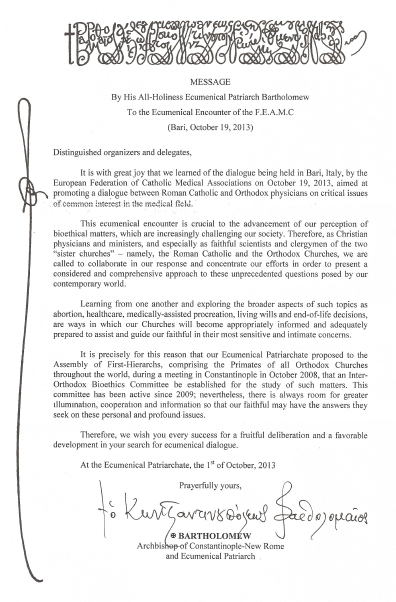
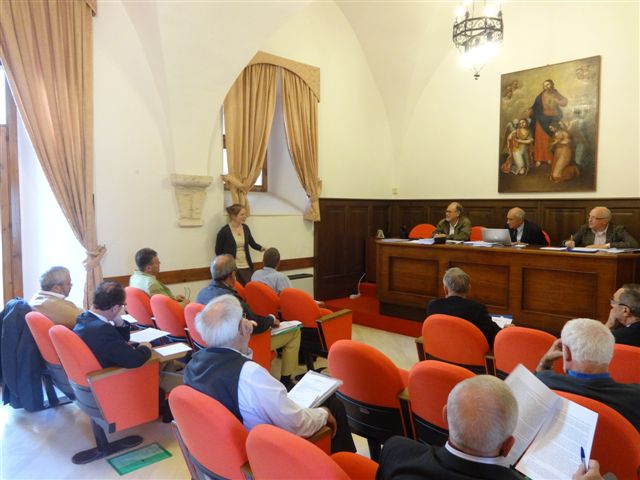
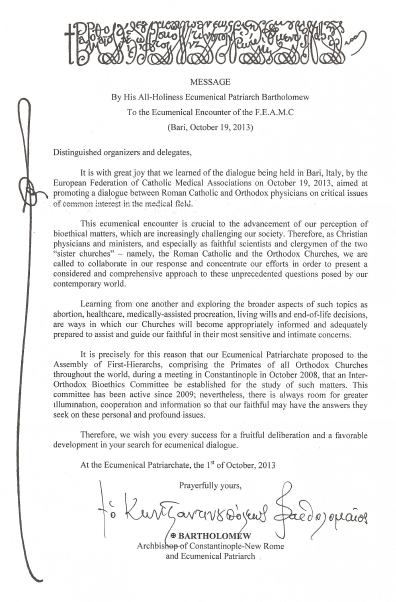
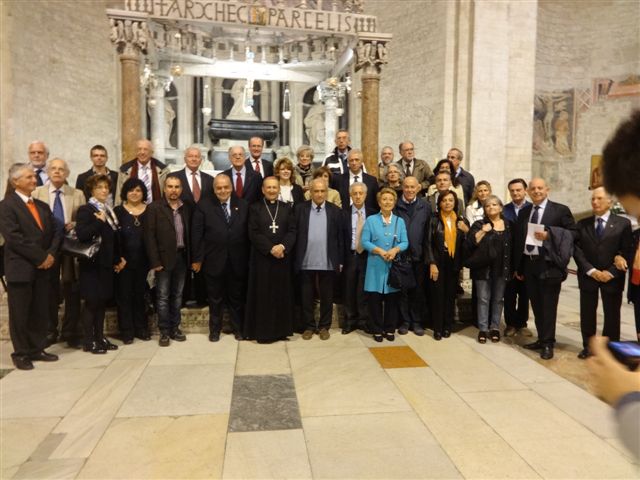
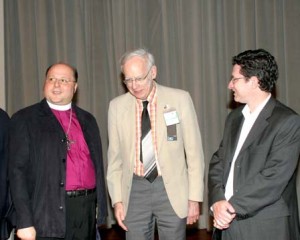
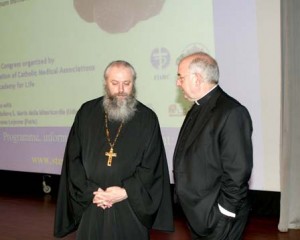
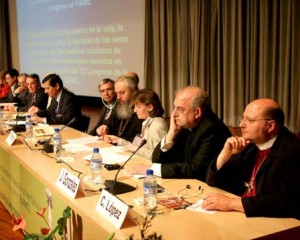
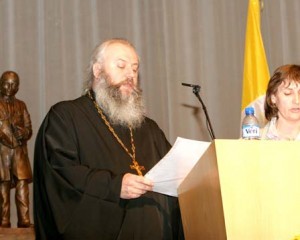
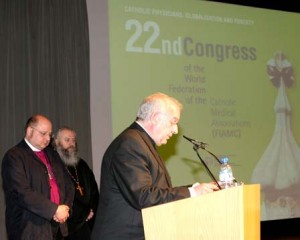


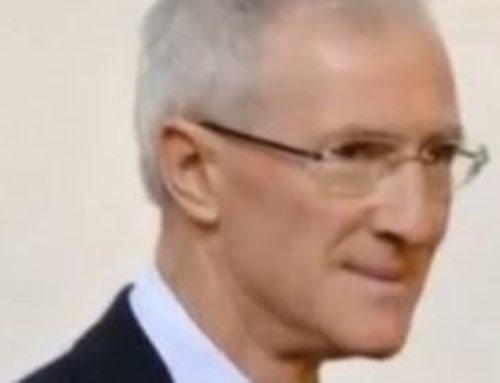
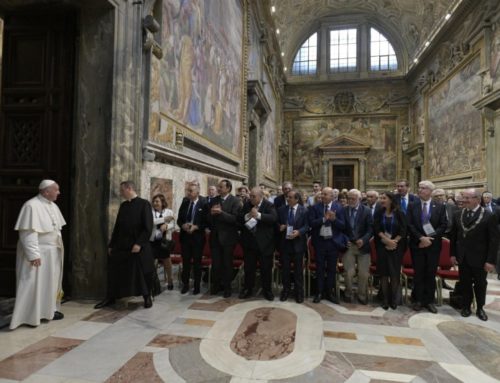





[…] http://www.fiamc.org/texts/ecumenism-catholic-doctors/ […]